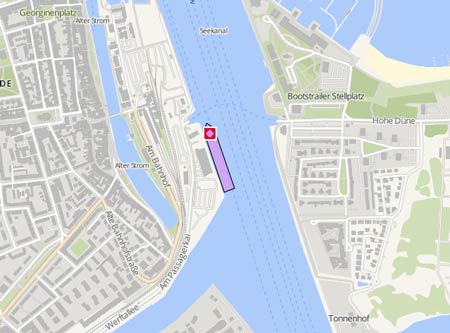PABLOscrapped
Course/Position
Latest ports
Latest Waypoints
Latest news
Pablo disaster reveals the secrets of a shadow tanker network
More than four months after the explosion, the 'Pablo' was still moored off the coast of Malaysia untouched. The vesselwas part of a growing fleet of shadow tankers, transporting sanctioned oil with little regard for industry regulations. Shadow vessels are characterised by their repeated change of flag carriers and owners – and crucially – often operate without insurance. Without a listed insurer, the 'Pablo' remains where it is. Such ships pose a serious threat to the environment, as well as the lives of those they come into contact with. But the shadow trade of ships like the 'Pablo' is only growing in size and scale – taking journeys that thread their way through the world’s geopolitical hotspots; from the oilfields of Iran, to the factories of China, all the way to the frontline of Russia’s war against Ukraine. Five years ago the 'Pablo' was set to be sold as scrap. Then named 'Olympic Spirit II', its demolition was cancelled due to a sudden surge in demand for older tankers. With the trade of Iranian oil under threat, a fleet of shadow vessels, willing to defy international sanctions, stepped in to ship millions of barrels of oil around the world, often selling it at a discount price. The 'Pablo' was on a list of 50 tankers that routinely shuttled Iranian oil. In June 2021, the 'Pablo' was sailing as 'Adisa' under the flag of Cameroon. After the US watchdog group United Against Nuclear Iran (UANI), informed the country of the ship’s activity, that flag was withdrawn. Just a few months later it was sailing under the name 'Helios' with the flag of the Cook Islands. But after UANI provided evidence of sanctioned trades, that flag also was withdrawn. By 2022 ihe ship was named 'Mockingbird' and registered to Tanzania, who also withdrew their flag after being contacted by UANI. On April 4, UANI contacted the Gabonese authorities who had now registered the ship under the name 'Pablo'. While promising to continue to monitor the vessel, the country’s department of maritime affairs also said that it had carried out due diligence and had taken a letter of understanding from the ship’s owners that it would comply with all US, UN and EU sanctions. As of now, the 'Pablo' remains abandoned. Malaysia’s marine department has confirmed the owner and manager of the ship responded to its requests to deal with the vessel, but that the details of their correspondence was being kept confidential. A local salvage company has been appointed and the department is monitoring the 'Pablo' to ensure the safety of the ship. The three missing crew members were ever found.
Pablo may be behind oil spill in Indonesia
Indonesian authorities are investigating the sources of the pollution of an oil spill, while Malaysia has reported it is currently too dangerous to board the burned-out 'Pablo'. The ship was part of the “shadow fleet”, which aims to avoid sanctions on mainly Iranian oil exports. The 'Pablo' was allegedly preparing for a ship-to-ship transfer of Iranian oil bound for China when the fire destroyed the tanker on May 1. The Royal Malaysian Navy’s KD 'Pendekar' and the Marine Department’s m/v 'Polaris' were still stationed at the wreck, engaging in water spray operations on the hull to cool the vessel. However, conditions have prevented the Fire and Rescue Department’s Hazardous Materials Task Force from inspecting the hull for contamination or searching for the still-missing crew members. The Ministry of Environment and Forests in Indonesia are taking samples of the oil to determine the source of the pollution, as well as collecting the oil with trucks to store it in barrels and sacks for further analysis. Although there have been no reports of significant hull damage, a series of explosions during the fire ruptured the tanker’s fuel tanks.
Wreck of dark fleet tanker causes headache for authoities
For the maritime authorities, the headache regarding the wreck of the 'Pablo' has just begun. There was little evidence of the owner, a Marshall Islands-registered company whose fleet contains no other ships, and no trace of insurance, both vital for a clean-up to begin. The incident underlines the risks that come with the expansion of a dark fleet of ageing vessels moving sanctioned oil around the globe.Since the wave of sanctions that followed Russia’s invasion of Ukraine, including the price caps imposed by the Group of Seven, intended to limit oil cash going back to the Kremlin. With limited details on who is responsible for the 'Pablo' there has been no one to hold to account as it burned just 40 nautical miles off Malaysia’s Pulau Tinggi island. Oil, potentially from the wreck, has been reported washing up on Indonesia’s coast. Almost a week after this explosion, there is little sign of the insurer to get moving. The 'Pablo' is not listed in an industry database of insured vessels. It is highly unlikely that selling what is left of the charred tanker would cover the costs of removal. The tanker was flying the flag of Gabon, which is outside the MOU. It was built in 1997, meaning it is far beyond the age at which most tankers are sold as scrap. The tanker hgad spent two months at a shipyard near Shanghai, but before that its last two voyages were to deliver crude to Chinese ports in the Shandong province. Both cargoes were identified as Iranian heavy crude, which is sanctioned. The Malaysian authorities have suspended SAR operations in the evening of May 5 as efforts have not turned up any sign of the crewmen. The explosion has made the ship unsafe to board, leaving it stuck off the coastline for the time being.
Upload News

